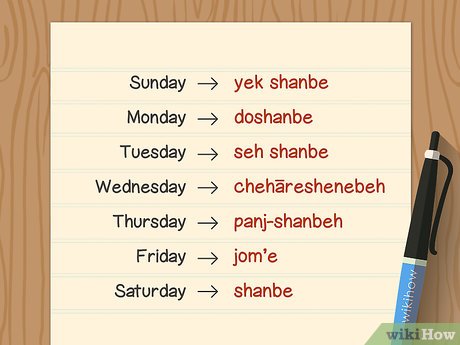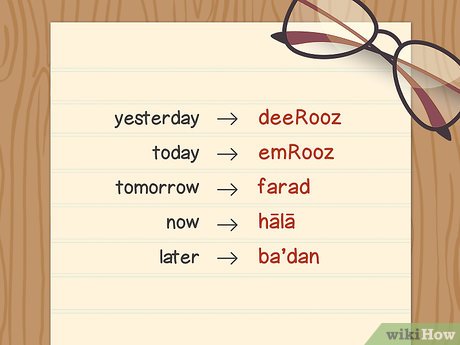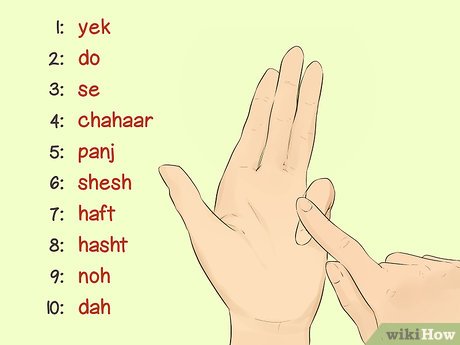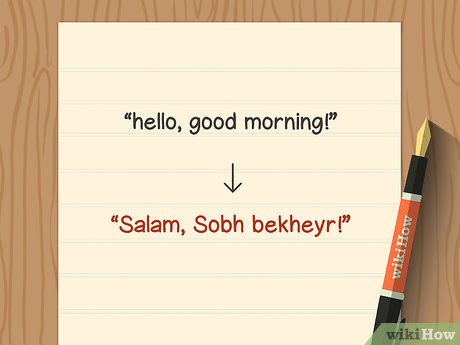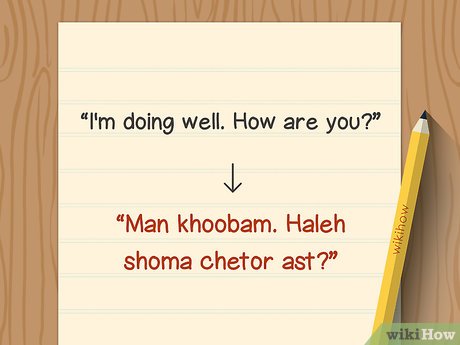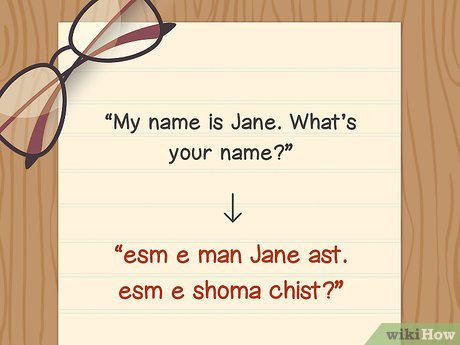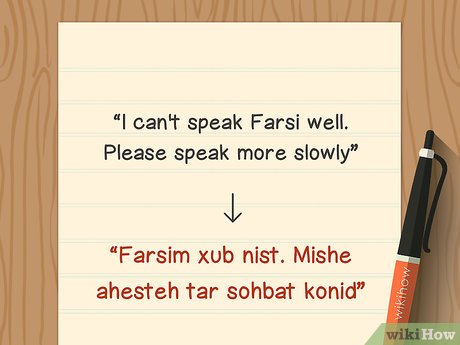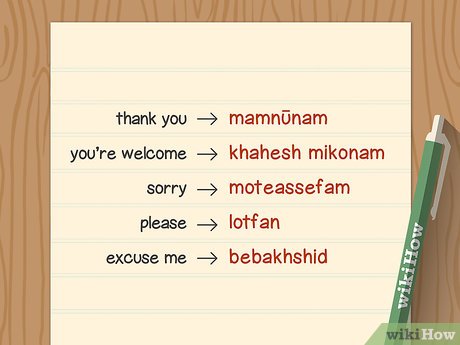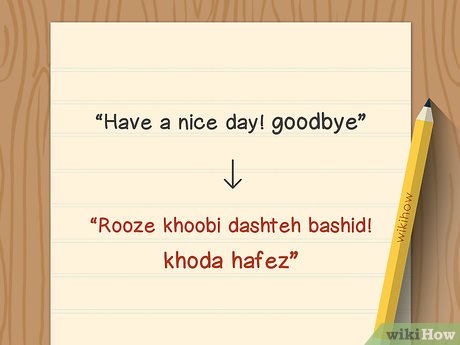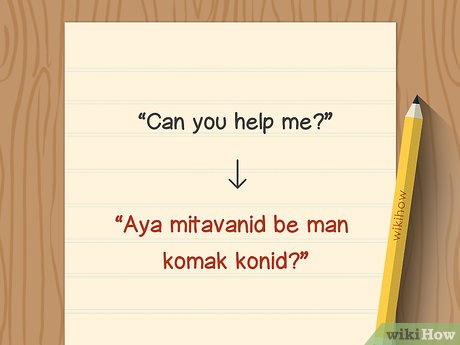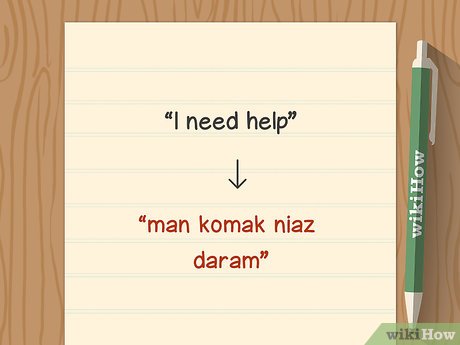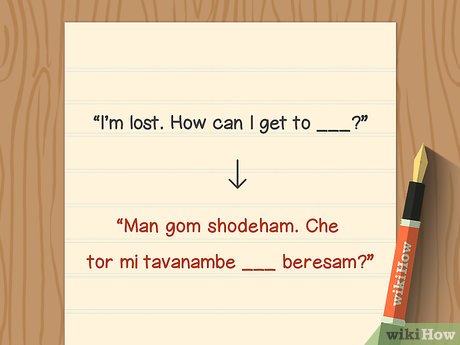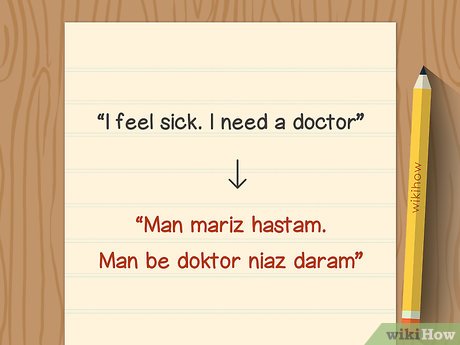How to Say Most Common Words in Farsi
Method 1 of 3:
Adding Essential Vocabulary
-
 Start with baleh and nakheyr for "yes" and "no." These are 2 of the most basic words in any language, and essential if you're navigating in an area where Farsi is spoken. If someone offers you something, add "thank you" to the end by saying nakheyr, mamnūnam.[2]
Start with baleh and nakheyr for "yes" and "no." These are 2 of the most basic words in any language, and essential if you're navigating in an area where Farsi is spoken. If someone offers you something, add "thank you" to the end by saying nakheyr, mamnūnam.[2]- Be careful using these words if you don't completely understand what the person said. You might try man nemidânam (I don't know) or nemifahmam (I don't understand).
Tip: When speaking casually to people you know or people your own age, you can shorten nakheyr to na.
-
 Learn the days of the week. If you're traveling, you'll need to know the days of the week so that you know when to be somewhere or when you need to check out of your lodging.[3]
Learn the days of the week. If you're traveling, you'll need to know the days of the week so that you know when to be somewhere or when you need to check out of your lodging.[3]- Sunday: yek shanbe یکشنبه
- Monday: doshanbe دوشنبه
- Tuesday: seh shanbe سه شنبه
- Wednesday: chehāreshenebeh چهارشنبه
- Thursday: panj-shanbeh پنج شنبه
- Friday: jom'e جمعه
- Saturday: shanbe شنبه
-
 Pick up other words to describe dates and times. You're not always going to use the day of the week to tell someone when something happened or is going to happen. You might want to say deeRooz (yesterday), emRooz (today) or farad (tomorrow).[4]
Pick up other words to describe dates and times. You're not always going to use the day of the week to tell someone when something happened or is going to happen. You might want to say deeRooz (yesterday), emRooz (today) or farad (tomorrow).[4]- The word for day is Rooz (روز.) If something happened in the morning, you would use the word sobh (صبح). The word for evening is asr (عصر), while the word for night is shab (شب).
- You might also use hālā (حالا), which means "now," or ba'dan (بعداً), which means "later."
-
 Count to 10 in Farsi. Counting to 10 is one of the first things you typically learn in any language. To count from 1 to 10 in Farsi, say yek, do, se, chahaar, panj, shesh, haft, hasht, noh, dah.[5]
Count to 10 in Farsi. Counting to 10 is one of the first things you typically learn in any language. To count from 1 to 10 in Farsi, say yek, do, se, chahaar, panj, shesh, haft, hasht, noh, dah.[5]- Ordinals are also important, especially if people are talking about dates. Nokhost (نخست) means "first," doovom (دوم) means "second," and sevom (سوم) means "third."
Method 2 of 3:
Making Basic Conversation
-
 Use Salam (سلام) to say "hello" in most settings. The word "Salam" literally translates to "peace" and is used as a general greeting throughout the Muslim world. This greeting is appropriate to use with anyone, at any time of day.[6]
Use Salam (سلام) to say "hello" in most settings. The word "Salam" literally translates to "peace" and is used as a general greeting throughout the Muslim world. This greeting is appropriate to use with anyone, at any time of day.[6]- Another common greeting in Farsi is dorood (درود). This is an older, more traditional greeting that means "hello."
- If you're greeting someone who is entering your home, you might also say Khosh amadid! (!خوش آمدید), which means "welcome."
Greetings for Specific Times of Day:
Good morning: Sobh bekheyr! (!صبح بخیر)
Good evening: Asr bekheyr! (!عصر بخیر)
Good night: Shab bekheyr! (!شب بخیر)
-
 Ask Haleh shoma chetor ast? (حال شما چطور است؟) for "How are you?" After saying "hello," it's common in Persian cultures to ask after the other person's well-being. If the other person asks you first, you might reply Man khoobam (.من خوبم), which means "I'm doing well."[7]
Ask Haleh shoma chetor ast? (حال شما چطور است؟) for "How are you?" After saying "hello," it's common in Persian cultures to ask after the other person's well-being. If the other person asks you first, you might reply Man khoobam (.من خوبم), which means "I'm doing well."[7]- If you're talking to a close friend or someone your age or younger, you might try Halet chetore? (چطوری؟), which is a very informal, similar to saying "What's up?"
-
 Introduce yourself by saying Esme man... ast (.اسم من است). To tell the person your name, say "Esme man," then your name, followed by "ast." For example, if your name is Sarah, you would say "Esme man Sarah ast." To ask the other person's name, say Esme shoma chist?[8]
Introduce yourself by saying Esme man... ast (.اسم من است). To tell the person your name, say "Esme man," then your name, followed by "ast." For example, if your name is Sarah, you would say "Esme man Sarah ast." To ask the other person's name, say Esme shoma chist?[8]- When the other person tells you their name, you might say Az molaaghat e shoma khosh-bakhtam. (.از ملاقات شما خوشبختم), which means "nice to meet you." You can also simply say "khoshbakhtam."
-
 Explain that you only speak a little Farsi. If you're just learning Farsi but still want to have a conversation, you might say Farsim xub nist (فارسیم خوب نیست), which means "I can't speak Persian/Farsi well." You might also say mishe ahesteh tar sohbat konid or "please speak more slowly," if you're having trouble understanding the person.[9]
Explain that you only speak a little Farsi. If you're just learning Farsi but still want to have a conversation, you might say Farsim xub nist (فارسیم خوب نیست), which means "I can't speak Persian/Farsi well." You might also say mishe ahesteh tar sohbat konid or "please speak more slowly," if you're having trouble understanding the person.[9]- You could add nemifahmam (نمي فهمم), which means "I don't understand."
- If you would feel more comfortable talking in English, you might ask Engelisi yâd dâri? (انگلیسی یاد داری؟) or "Do you speak English?"
-
 Express your gratitude by saying mamnūnam (ممنونم) for "thank you." This is a relatively formal way to say "thank you" in Persian. Persians also say merci, like the French. However, this is considered a more casual expression.[10]
Express your gratitude by saying mamnūnam (ممنونم) for "thank you." This is a relatively formal way to say "thank you" in Persian. Persians also say merci, like the French. However, this is considered a more casual expression.[10]- If the person thanks you, reply khahesh mikonam(خواهش مي كنم), which means "you're welcome."
- Other polite words in Farsi include moteassefam (sorry), lotfan (please), and bebakhshid (excuse me).
-
 End a conversation with bedrood (بدرود) for "goodbye." When you're ready to part ways, this is a basic way to say "goodbye." You could also say khoda hafez (خدا حافظ), which also means "goodbye."[11]
End a conversation with bedrood (بدرود) for "goodbye." When you're ready to part ways, this is a basic way to say "goodbye." You could also say khoda hafez (خدا حافظ), which also means "goodbye."[11]- In the morning, you might also say Rooze khoobi dashteh bashid! which means "Have a nice day!"[12]
- If the person continues to talk to you, you might say man bayad beravam, which means "I have to go."[13]
Method 3 of 3:
Asking for Help
-
 Start with Bebakgshid to get someone's attention. This word means "excuse me," and is the polite way to get someone's attention before asking them a question. Then you might say Aya mitavanid be man komak konid?, which means "Can you help me?"[14]
Start with Bebakgshid to get someone's attention. This word means "excuse me," and is the polite way to get someone's attention before asking them a question. Then you might say Aya mitavanid be man komak konid?, which means "Can you help me?"[14]- You might also say Man ahle inja nistam if you want to tell the person "I'm not from here."
-
 Use man komak niaz daram to ask pointedly for help. This phrase literally means "I need help," so if you have a problem, saying this will alert them. However, you should probably be prepared to explain your problem in Farsi. Otherwise, ask Aya shame Engilisi? or "Do you speak English?"[15]
Use man komak niaz daram to ask pointedly for help. This phrase literally means "I need help," so if you have a problem, saying this will alert them. However, you should probably be prepared to explain your problem in Farsi. Otherwise, ask Aya shame Engilisi? or "Do you speak English?"[15]- You might also say Komakam kon! which means "Help me!" Save this for times when something more serious is going on – not for times when you just need to ask directions or find the restroom.
-
 Get directions if you're lost. It can be hard to get around in an unfamiliar place, especially when all the signs are in a language you're just starting to learn. Say Man gom shodeham to tell someone that you are lost. Then show the person where you want to go. Having a written name, map, or photo can help.[16]
Get directions if you're lost. It can be hard to get around in an unfamiliar place, especially when all the signs are in a language you're just starting to learn. Say Man gom shodeham to tell someone that you are lost. Then show the person where you want to go. Having a written name, map, or photo can help.[16]- If the place you're looking for is nearby, you might say Aya mitavanid be man neshan dahid? which means "Can you show me?"
- If you just want to know where the nearest bathroom is, ask dashtshuee kojast? It's generally best to ask someone who is the same gender as you.
-
 Say man mariz hastam (من مریض هستم) if you feel sick. This phrase lets those around you know that you're not feeling well. If you're really bad off, you might also say Man be doktor niaz daram, which means "I need a doctor."[17]
Say man mariz hastam (من مریض هستم) if you feel sick. This phrase lets those around you know that you're not feeling well. If you're really bad off, you might also say Man be doktor niaz daram, which means "I need a doctor."[17]- In an emergency situation, you might say Doktor ra seda konid! (Call a doctor!) or Ambulance ra seda konid! (Call an ambulance!).
Tip: If you're in an emergency situation and don't feel comfortable describing your needs in Farsi, say Injâ kasi Engelisi midânad? which means "Is there someone here who speaks English?"
Share by
Isabella Humphrey
Update 24 March 2020

